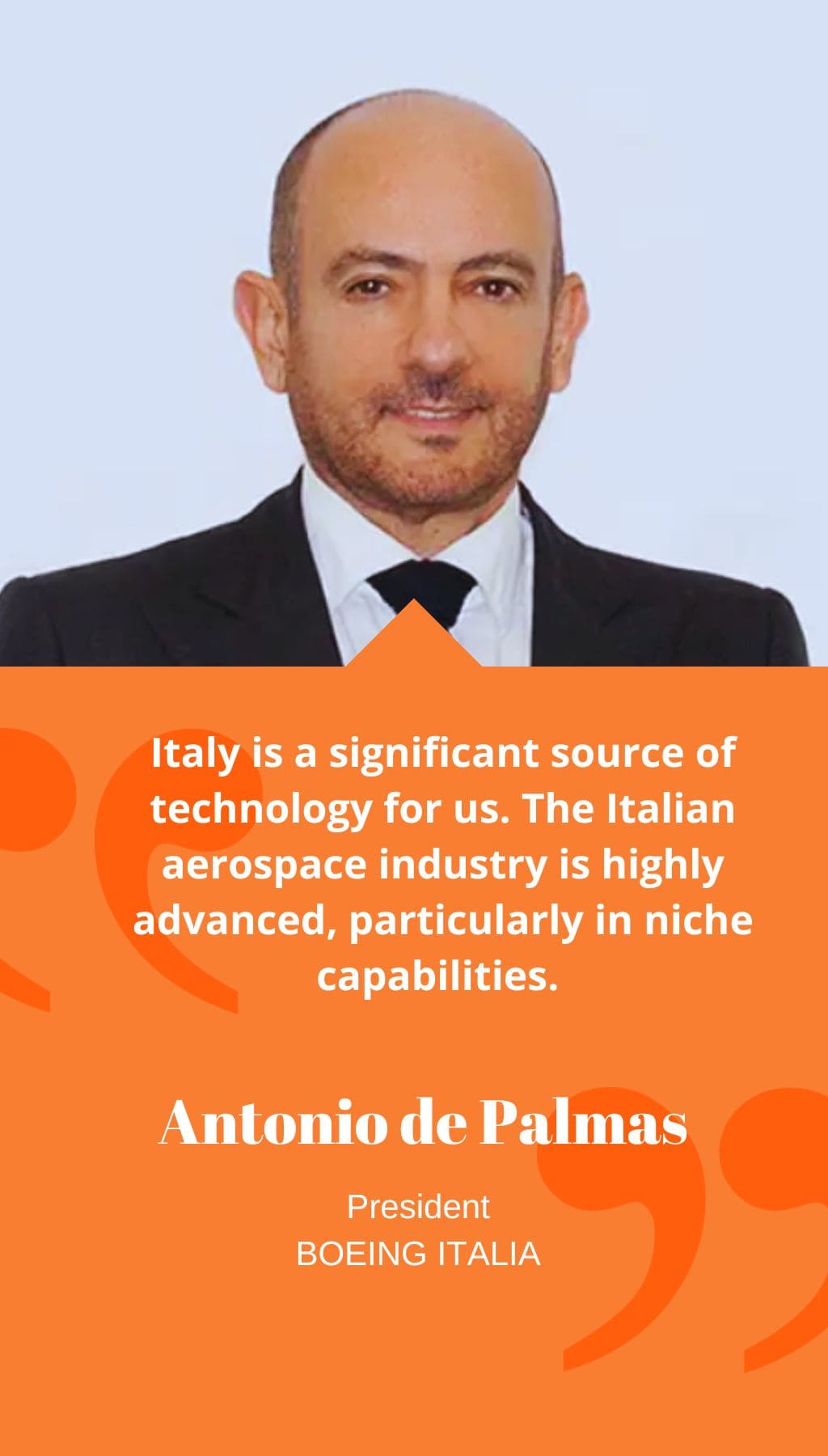
- Italy | 29 March 2018

Boeing Italy recently celebrated its 65th anniversary at the Farnborough airshow this year. Can you tell us about some of the significant milestones in Boeing Italy’s long history?
Aviation began just a few years before Boeing emerged, and our predecessors accomplished things that were once deemed impossible. We have no doubt that the second century has to be framed in the same way. Speaking of highlights, we can recall when the Italian industry was involved in manufacturing McDonnell Douglas aircraft in the 1970s. This was a significant change in quality for aircraft manufacturing, and it recognized the strong partnership between Boeing Italy and Alitalia, which was one of the largest operators of McDonnell Douglas aircraft, especially the MD-80. The second highlight was the 787 Dreamliner, which we initiated in 2004. The Italian industry, along with Leonardo, played a crucial role in manufacturing composites at a new state-of-the-art facility in the south of Italy. This partnership has been growing, and the Grottaglie facility is the second-largest industrial facility in Southern Italy, second only to the Fiat plant in Melfi.
What is the importance of the humanitarian projects that Boeing undertakes?
Almost 70% of our revenue comes from outside the United States, and this is constantly growing. The commercial airplane industry is expanding, and approximately 40,000 new airplanes will be needed in the next 20 years. Asia will become the world’s largest aerospace region, outpacing the United States and Europe. As part of our global reach, we have a philosophy of getting closer to the communities we work with. We sell products that aid relief efforts, such as the Chinook helicopter, which is a unique way of providing assistance in times of disaster. We recently used them during the earthquake in central Italy and to fight a fire in Rome. Additionally, we are teaching environmental education and promoting environmental awareness in primary and secondary schools.
What is the significance of the Italian market for Boeing?
Italy is a significant source of technology for us. The Italian aerospace industry is highly advanced, particularly in niche capabilities. Umbra Cuscinetti has improved their technologies to a point where they have become a world leader in aerospace. Alitalia has been a great customer for Boeing, and Italy has always been an open market for us in terms of defense products, notably the Chinook but also the KC-767 tanker, which has the most advanced air-to-air refueling capability worldwide. On the commercial side, new large customers reflect geopolitical shifts. Asia, China, Indonesia, India, the Middle East, and South America are experiencing economic growth, and the middle class is becoming stronger. This does not mean that Europe and North America are becoming less important, but the focus is shifting. We have a strong partnership with Leonardo, and they are distributing the Chinook aircraft to the Italian army under a license with us.
What are the most significant advantages and disadvantages of operating in the Italian market?
Sometimes, Italy is not a very business-friendly environment in terms of bureaucracy, tax and legal systems, and uncertainty. However, in terms of aerospace, there are pockets of capabilities here. For example, in Piedmont, there are people who can do literally everything. Our partner Avio, which has been acquired by GE and is now in the engines of our three major aviation products, the 787, 737 MAX, and 777X, plays a large role in terms of volume and economy.
In your opinion, where do you believe Boeing will see the most growth in the upcoming years?
When considering the increasing number of people flying, which has already reached 3.5 billion, representing half of the global population, we anticipate growth in this area. However, we also recognize the potential for volatility within the market, and as such, we need to work to adapt to this. As a significant non-Italian aerospace entity, we have invested €5.6 billion in Italy, primarily due to the success of the 787 program, in addition to our partnership with Avio GE on the engines. Our collaborations with Alenia, Avio, and Leonardo have connected us with the three major programs (the 787, 737 MAX, and 777X), which are set to define commercial aviation for the next 20 years. With 150 people working for Boeing in Italy, we are proud to support the creation of 13,000 jobs. In terms of growth, we are also seeing potential within the defense market and the service business of defense, specifically with regards to integrated logistics and the tanker. Furthermore, we are optimistic about the growth of Alitalia, in partnership with Rome airport, and the expansion of the intercontinental network.














